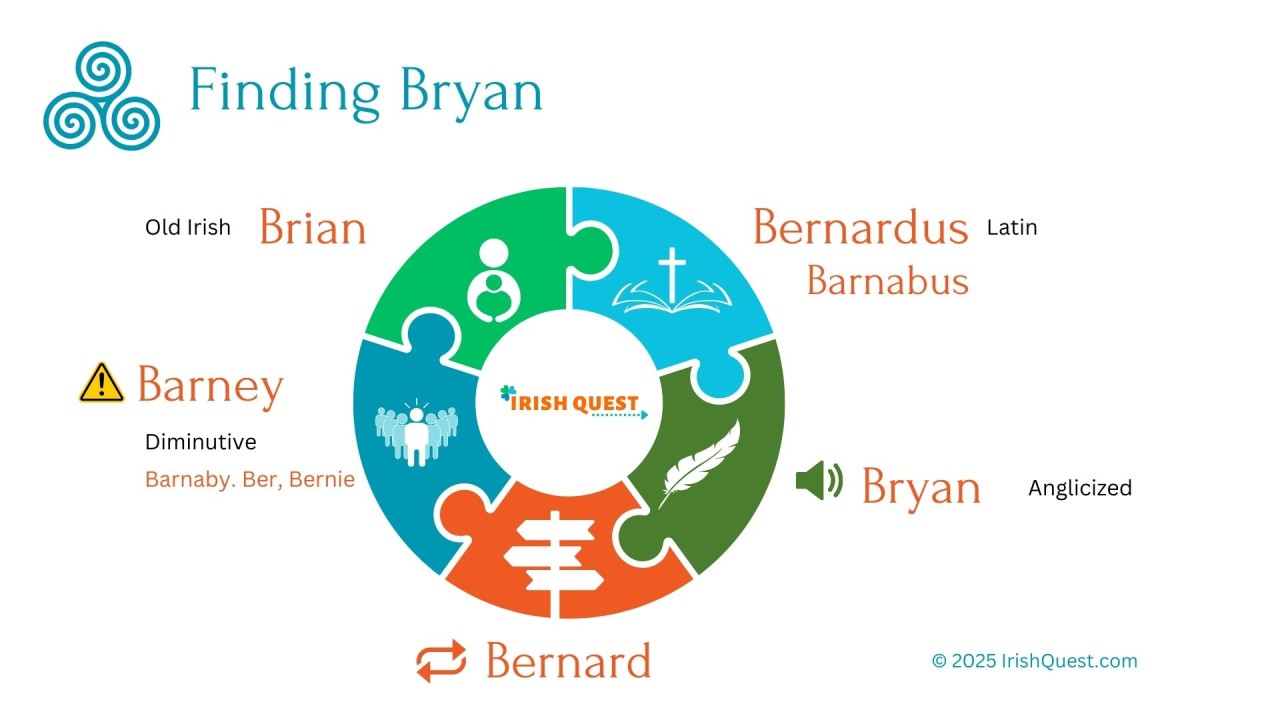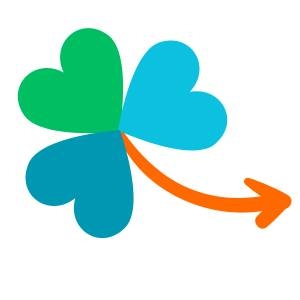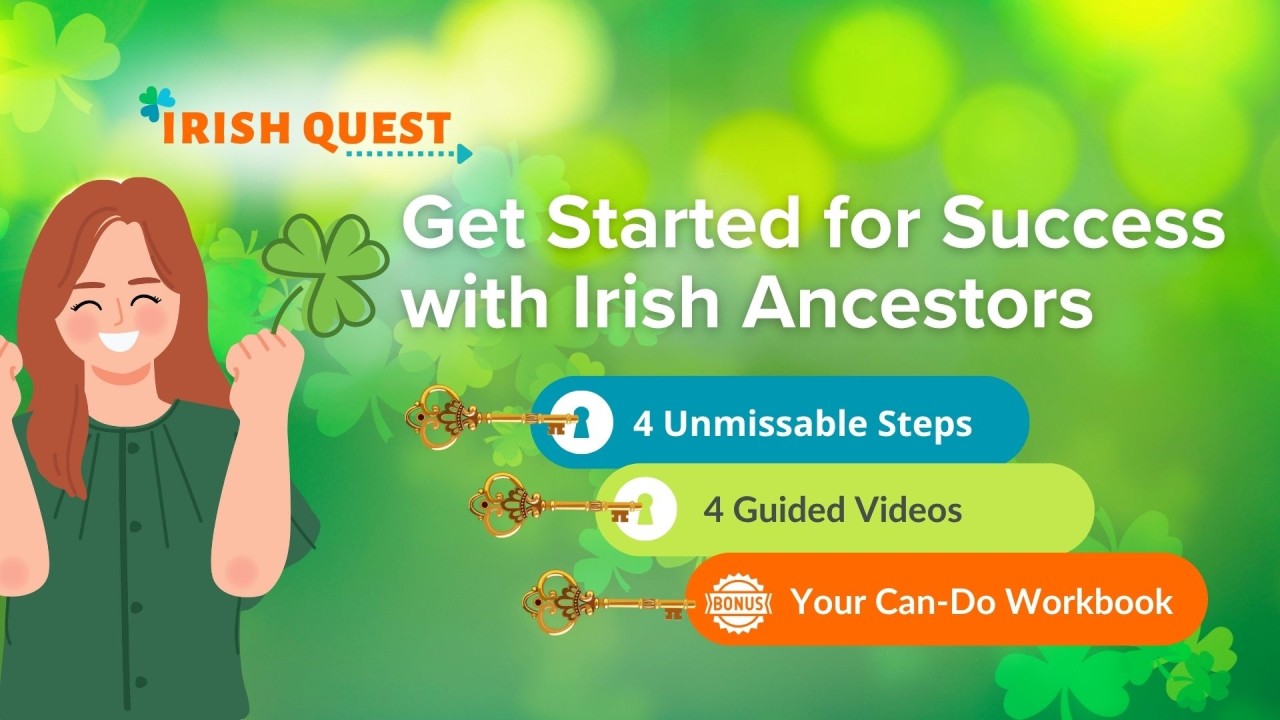Old Irish Names, Nickname & Aliases - Cheat Sheet

Discover Irish boys’ and girls’ names, their nicknames, and translations in our handy cheat sheet of aliases to help you trace your ancestors.
If you’ve been tracing your Irish family history, you may have noticed some puzzling name changes along the way. Maybe your ancestor appears in one record with one name, but in others, a completely different first name or nickname shows up. So if you have been asking yourself Did My Ancestor Change Name? this cheat sheet is for you.
The Irish given names that cause the most confusion in family research are often of old Gaelic Irish pre-Christian origin. When a child came to be baptised, Irish priests traditionally gave them a Latin “Christian name” for the church record. Later, that Latin alias often became the basis for the English name your Irish ancestor used in official documents.
For example, someone called Brian (Bryan) at home might have been baptised as Bernardus in Latin, and that informed why he used Bernard after immigrating. Meanwhile, another well-meaning priest might translate Bryan as Barnabus, so the same person could appear under Barnaby in a marriage record transcription or Barney in a Census record. Arrrrgh!

This is why your ancestor might seem to vanish — they’re still there, just recorded under different names. To find them, always search for all possible Latin and English versions of their Gaelic name.
I explin this in greater detail in my article → Did My Ancestor Change Name?
Wondering if an Irish nickname might actually stand for several different given names? You’re not alone - and you’ve come to the right spot! Here are your cheat sheets for unavelling the trickiest old Irish boy and girl names:
Old Irish Boys’ Names Cheat Sheet
| Gaelic Name | Latin Form (as in church records) | Common Anglicised / Nicknames | Meaning / Origin Notes |
|---|---|---|---|
| Aodh, Aedh, Aedán, Ádhán | Hugo, Hugonis, Hugones, Edanus | Hugh, Hubert, Herbert, Aidan, Aiden, Hughie, Huey, Aden, Hewdie, Huedy, Hiúdaí. | Means “fire”; a favored name among important Irish clans including O’Connors, O’Neills, and O’Donnells. |
| Aibhistín, Augustín | Augustinus, Augustus | Augustine, Austin, Gus, Gusty, Gussie, Gussy, Gusty | Irish form of Augustine, linked to saintly heritage; Norse form Oistín also used. |
| Aonghas, Aonghus | Antonius, Anthoni | Anthony, Angus, Aengus, Aonas, Aeneas, Eneas, Ennis, Enos, Gus, Anton, Ant | Means “one choice” or “excellent strength”; popular in Ireland and Scotland, borne by several saints. |
| Airt | Arturius, Artorius | Art, Arthur, Artúr, Artie, Arty, Addie, Ady | Means noble or generous; ancient Irish name used among multiple clans. |
| Beairtle, Bartlí / Partalán, Partalón | Bartholomaeus | Bartholomew, Bartle, Bart, Bartie, Bertie, Bartley, Bartly, Batt, Bat, Barty, Barthow., Bartow., Partholón | Derived from the biblical Bartholomew, with many variants. |
| Brian | Bernardus, Barnabus, Boeticus | Bryan, Bernard, Barnaby, Barney, Brien | Means “high” or “noble,” famously borne by the high king Brian Boru. |
| Ciarán | Kyrianus, Kieranus | Kieran, Ciar, Kieron, Kerne, Cairn, Kierrin, Kyran, Kieren, Cairan, Kernan | Means “little dark one”; name of early Irish saints. |
| Conchobhar, Conchubhar, Conchúr | Cornelius, Constantinus | Constantine, Conor, Connor, Con, Conn, Connie, Conny, Nialus | Means “lover of hounds”; classic Irish royal name. |
| Diarmaid, Diarmuid | Jeremias, Ieremias, Hieremias/ Dermitius, Demetrius, Dermicius | Dermot, Darby, Jeremiah, Jerome, Jerry, Derry, | Traditional Gaelic name with many historic bearers. |
| Domhnall, Dónall | Danielus, Danieli, Donaldus, Donatius, Donallus, Donatus | Donald, Daniel, Donal, Dan, Danny, Donny, Donnie, Don, Donie, Donat | Means “world-mighty.” |
| Donnacha, Donncha, Donnchadh, Donnchad, Donnchadha, Dúnchad | Donaldus, Duvenaldus Dyonisius, Dionisius, Dionysius | Denis, Donncha, Donagh, Donough, Donaghy Donny, Donnie, Dinnis, Dinny, Dinnie, Den, Don, Donie, Donal, | Common Gaelic name often rendered as Denis in records. |
| Éamon, Éamonn, Éanna | Edmundus, Eduardus | Edmond, Edmund, Enda, Edward, Edwin, Ned, Neddy, Ed, Eddie, Eddy, Edm., Edw. | Gaelic form of Edmund, meaning “wealthy protector.” |
| Eoghan, Eoin | Eugenius, Eugenus, Oenus, Owenus | Eugene, Owen, Gene | Means “born of the yew tree.” |
| Fergal, Feargal | Furgallum, Fergallus, Fernaldus, Ternaldus | Farrell, Farrill, Farrelle, Fergal, Ferrigal, Farrigal, Fregal, Fergie, Fergy, Ferdie, Fardy, Ferdinand, Virgil, Farage. | Means “man of valor,” with many regional spelling variants. |
| Féilim, Feidhlimidh | Fedelmius, Fedlimius, Fedlimidius, Fidelmidius, Fidelmius | Felim, Phelim, Phelimy, Felimy Pheily, Felix, Phillip, Phil, Philly, Phelen, Phelan / Pilib, Phalim, Phelam,Phelem, Pheliam, Phelem, Phelm, Phelum. | Medieval Gaelic name often Anglicised in multiple ways. |
| Flann, Flannán, Fitheal, Fithcheallach | Flannus, Flannanus, Florentius | Flan, Florence, Flannan, Florrie, Florry, Flor | Flan (and its diminutive Flannán) means “ruddy”. |
| Lorcán | Lorcanus, Laurentius | Lorcan, Lawrence, Laurence, Larry | Means “little fierce one.” |
| Maodhóg | Maidocus | Aidan, Moses, Mogue, Aedan, Ayden, Aodan, Aydin, Aydan, Adyn, Aidyn, Aedyn, (see also Aogán, Aodhagán, Aodhgan). | Maodhóg is a variant of Aodhán. The M represents ‘Mo’ meaning my. |
| Maolsheachlainn, Maeleachlain | Malachi, Malachius | Melachlin, Malachy, Lacky, Malachey, Malichy, Malicky, Mallachy, Malochy, Mallaghan, Millican, Michelan, Lackey, Lachey, Myles, Miles, Milo Maoileachlainn, Melaghlin, Loughlin, Laughlin, Lanty | Maolsheachlainn is the name of a disciple or servant of St Secundinus. |
| Niall, Néil, Niallán | Joannes
Neallus, Niallanus, Nigellus | Neil, Neal, Nicholas, Niallus, Niellus, Nellus, Nei, Nigel | Means “champion” or “noble knight.” |
| Raghnall, Rághnall | Raganaldus, Reginaldus Randlphus | Reginald, Ronald, Raonall, Randal, Randall, Randolph, Ralph, Raph | |
| Tadhg | Thaddeus, Thadius, Timotheus, Timotheus | Timothy, Tim, Thady, Thade, Theady, Thaddy, Tade, Teague, Teige | Means “poet” or “philosopher |
Old Irish Girls' Names Cheat Sheet
| Gaelic Name | Latin Form(s) | Common Anglicised / Nicknames | Origin / Meaning Notes |
|---|---|---|---|
| Ailbhe, Oilbhe | Albea | Alvy, Elva, Olive, Olivia, Bea | Means "bright," "white," "fair," "rock." |
| Aifric | Affrica, Africa | Aphria | Means "benefit" |
| Áine | Anna, Annae, Annam | Anne, Ann, Hannah, Honny, Nannie, Nanny, Nancy, Nance, Nanno, Nano, Nan, Naney, Nannie. | Means "brightness," "radiance," or "glow." |
| Aislinn, Aisling | Ester | Esther, Ashling, Hester, Ash, Essie | Means "dream" or "vision" |
| Aithche | Atia, Acia | Alicia, Atty | Aithche (pronounced AH-hee) is sometimes interpreted as "night" or "shadow" |
| Aoibheann, Aibfinn | Aibfinnia | Eavan, Yvonne, Evan, Evie, Evie, Evelyn, Eveline, Evelina | Gaelic name meaning "pleasant radiance" |
| Aoife | Eva | Eva, Eve, Aifa, Evie, Evey, Evy | Gaelic form meaning "life" or "beauty" |
| Athracht | Attracta | Attracta | Meaning uncertain, linked to an early Irish saint |
| Bean Mhumhan | — | Benvon; Nicknames: Benna, Benie, Bency | Traditional Gaelic name |
| Bean Mhidhe | — | Benvy, Benna, Benie, Bency, Benery, Benry | Means "Lady of Meath." |
| Béibhinn | — | Bevin, Vivian, Vivienne, Babe, Baby | Means "fair lady" |
| Blinne, Bluinse | Moninna | Blanche, Moninne | Early Irish saint's name |
| Bláth, Bláthnaid, Bláthnait | Florentia, Flora | Florence, Flo, Flossie, Flors | Means "flower" or derived from. |
| Bríd | Bidelia, Brigida, Phidelia | Bridget, Brigid, Delia, Breeda, Biddy, Breege, Bride, Bridie, Bessie, Dina, Dilly, Dillie, Beesy, Dina, Bedina, Cordelia | Saint Brigid’s name, very common in Ireland |
| Caoilfhionn | Coelfinnia | Keelin, Keelie, Keely, Keeleen | Means "slender and fair" |
| Caoimhe | Pulcheria | Keavy, Keavah, Keevie, Keevy | Means "gentle, beautiful" |
| Clíona | — | Cleena, Cliona, Cliodhna, Clionadh, Cliodna, Kleena | Mythological Irish name |
| Dairíne | Darina | Darene, Dareen, Darry, Darrie, Dereenie, Reena, Rina, Reeny | Gaelic personal name |
| Damhnait | Dymphna | Devnet, Downet, Dymphna | Means "little doe" or "little fawn", |
| Dearbháil / Deirbhile | Dervilia | Derval; Nicknames: Dervy | Ancient Gaelic name |
| Doireann | Dorinnia, Darina | Dorothy, Darina, Doreen, Dora, Dot, Dotty | Means "ash tree" |
| Etáin | Etania | Etaun, Etty | means “jealousy” or “passion.” |
| Éadaoin | Edwina | Aideen, Edwina | Means "little fire" |
| Eithne | Ethnea | Ethna, Enya, Annie | Ancient Irish name meaning "kernel" or "grain" |
| Fionnuala | Finguala, Finola | Finola, Fionna, Flora, Nuala, Penelope, Penny Nappy, Nappa, Nell, Nelly | From the mythology of the Children of Lir |
| Gobnait | Abigail, Gobnata | Abigail, Gail, Abbi, Abbie, Abby, Abina, Bena, Bina, Deborah, Debbie, Debby, Gobinet, Gobnet, Gubbie, Gubby, Libby, Nabbie, Nabby, Webbie, Webby | Means "she who gives help" a saint. |
| Gráinne | Grania, Gratia | Grace, Gertrude, Gertie, Gerry, Jerry, Trudy, Trudie, Grissel, Grizel, Grizzel | Gaelic for "love"; mythological Irish heroine |
| Márgrég | Margarita | Margaret, Maggie, Molly, Minnie, Greta | An early medieval form of Margaret meaning "pearl" |
| Meadhbh, Méabh | Bena | Maud, Bina, Mabel, Margery, Marjory, Madge, Méibhinn | Legendary queen from "The Cattle Raid of Cooley" |
| Muireann | Murinnia | Morinn, Marion, Madge, Mo | Muireann (pronounced Mwir-in) means means "sea white" or "sea blonde." |
| Niamh | Nabitha | Neve, Neeve, Neve, Niav, Neevy, Ninnie, Ninny, Niney, Nevia, Niva, Neeves, Nives, Niveen, Neeveen, Nivin | Means "brightness" or "radiance" |
| Órfhlaith, Órla | Orlata | Orla | Means "golden princess" like Goldilocks |
| Ríonach | Regnacia, Regina | Regina, Reena, Reenie, Reeny, Reg, Ina | Means "regal" or "queen-like" |
| Sadhbh, Sabha | Sabia, Sabina | Sarah, Sarah, Sive, Sabina, Sophia, Sally, Sal, Sophie, Sophy, Sarah, Sibby, Sibbie, Bee, Bina, Sadie | Means "sweet, good" |
| Sorcha | Sorcha | Clara, Sarah, Sorca, Sorsha, Sally, Sal, Sadie | Means "bright, radiant" |
| Treasa, Treise | Teresia | Teresa, Theresa,Tressa, Trassa, Toireasa Tressy, Treesy, Terry, Tess, Tessie | Treise (pronounced Tresh-a) means "strength" or "power." |
| Úna | Una | Agnes, Aggie Winifred, Winnie Oonagh, Oona, Unity | Gaelic name meaning "lamb" |
How to Use This Cheat Sheet
-
When searching Irish genealogy records, try all the variants—Gaelic, Latin, and Anglicised/nicknames—since your ancestor may appear under any of these.
-
Latin forms commonly appear in church records—especially baptisms and marriages— but may inform the English name your ancestor used.
-
Be mindful of regional spelling variants and nicknames; Irish names were highly flexible, especially in the 19th century. More about this in my article → Did My Ancestor Change Name?
-
Combine these with surname variations to improve your chances of uncovering elusive ancestors.
Common given names like James, John, Michael, Thomas, William, Catherine, Eileen, Eleanor, Honora, and Joanne were Christian names introduced to Ireland by the Normans, rather than old Gaelic Irish names (so they are not included in this cheat sheet).
Join my free community to ask questions about other Irish first names HERE.
Happy hunting!

Irish ancestry research doesn't have to be as confusing as they say. The first key step is to get up close and personal with your ancestors aliases so you can find them on record faster and easier.
That is why I have broken it down into 4 unmissable Can-Do Steps in my latest workbook & mini-course:

Click here to check out my special introductory offer → [ Get Started for Success with Irish Ancestors ]
Categories: : Irish Names
 Irene ó Irish Quest
Irene ó Irish Quest 